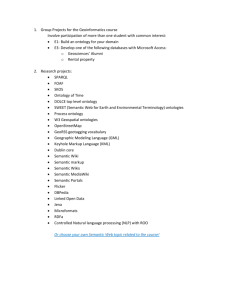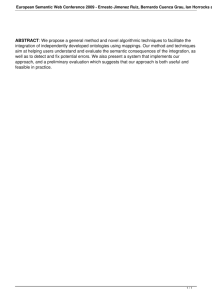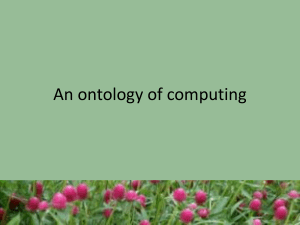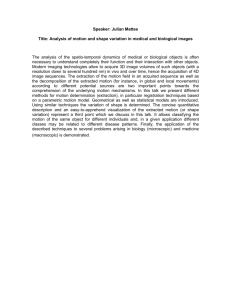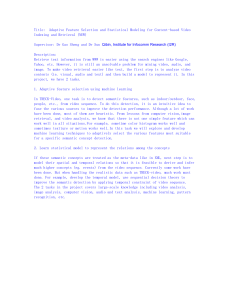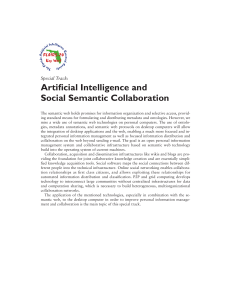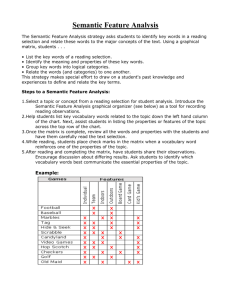Concept Extraction Applied to the Task of Expert Finding Georgeta Bordea
advertisement
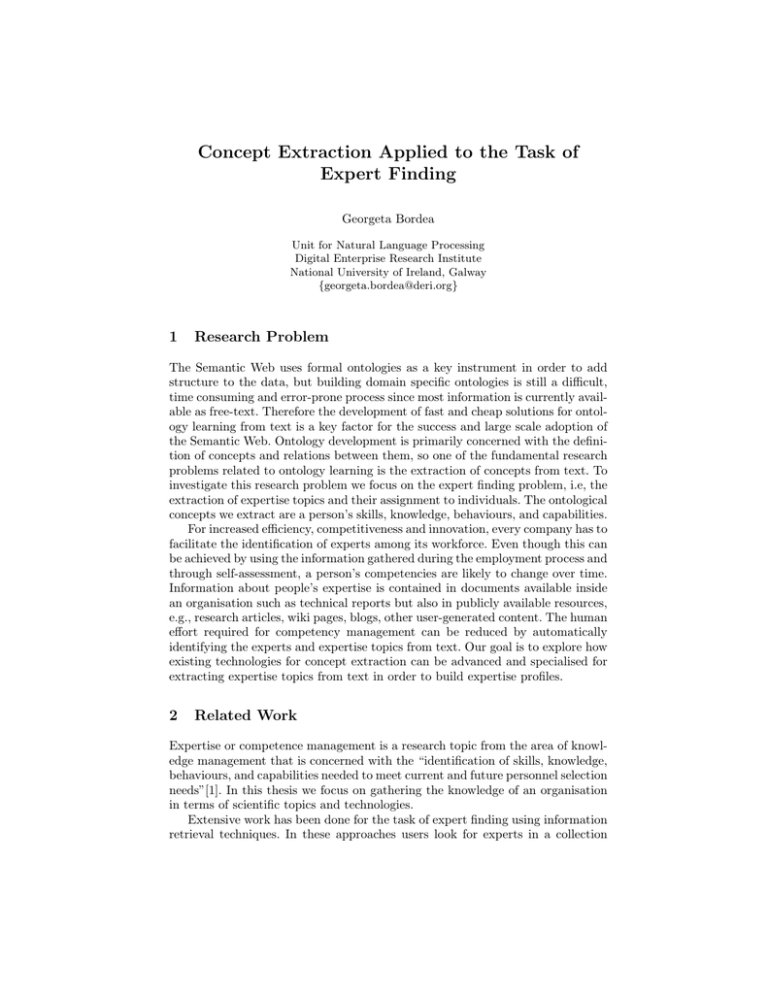
Concept Extraction Applied to the Task of
Expert Finding
Georgeta Bordea
Unit for Natural Language Processing
Digital Enterprise Research Institute
National University of Ireland, Galway
{georgeta.bordea@deri.org}
1
Research Problem
The Semantic Web uses formal ontologies as a key instrument in order to add
structure to the data, but building domain specific ontologies is still a difficult,
time consuming and error-prone process since most information is currently available as free-text. Therefore the development of fast and cheap solutions for ontology learning from text is a key factor for the success and large scale adoption of
the Semantic Web. Ontology development is primarily concerned with the definition of concepts and relations between them, so one of the fundamental research
problems related to ontology learning is the extraction of concepts from text. To
investigate this research problem we focus on the expert finding problem, i.e, the
extraction of expertise topics and their assignment to individuals. The ontological
concepts we extract are a person’s skills, knowledge, behaviours, and capabilities.
For increased efficiency, competitiveness and innovation, every company has to
facilitate the identification of experts among its workforce. Even though this can
be achieved by using the information gathered during the employment process and
through self-assessment, a person’s competencies are likely to change over time.
Information about people’s expertise is contained in documents available inside
an organisation such as technical reports but also in publicly available resources,
e.g., research articles, wiki pages, blogs, other user-generated content. The human
effort required for competency management can be reduced by automatically
identifying the experts and expertise topics from text. Our goal is to explore how
existing technologies for concept extraction can be advanced and specialised for
extracting expertise topics from text in order to build expertise profiles.
2
Related Work
Expertise or competence management is a research topic from the area of knowledge management that is concerned with the “identification of skills, knowledge,
behaviours, and capabilities needed to meet current and future personnel selection
needs”[1]. In this thesis we focus on gathering the knowledge of an organisation
in terms of scientific topics and technologies.
Extensive work has been done for the task of expert finding using information
retrieval techniques. In these approaches users look for experts in a collection
of documents by giving a query with the topics of interest [2–4]. The proposed
solutions are matching the user’s query against the document collection in order
to find the experts. This approach makes the assumption that the user is looking
for an expertise topic, so it is not possible to find the expertise profile for a person. Other approaches rely on ontologies for competency management, building
inference services ([5, 6]). The ontologies are used for matchmaking services that
bring together the skills demand and supply [7], but these methods can not be
applied for domains where an ontology of skills is not already built. An approach
to build an ontology of competencies has been proposed in [8], making use of an
already built domain ontology, but this can not be applied for domains where an
ontology is not defined or where new concepts are introduced often.
In [9] the relations between people and skills are extracted as a network of
associations, both people and competencies being handled as entities. Although
here the dynamic and automated support of expertise management is addressed,
a deeper analysis of expertise topics is needed. Expertise should be analysed on
several levels (knowledge, ability, centrality, and context). We analyse expertise
on all these levels and we implement an integrated text mining strategy for each
of them. In [10] an approach based on text genre specific lexico-syntactic patterns from scientific publications is investigated , but only a short list of context
patterns manually identified is considered. In our work we propose an automatic
method to identify context patterns that will increase the number of expertise
topics that are considered ([11, 12]).
3
Proposed Approach
The thesis is based on state of the art techniques from term and keyword extraction but applies these techniques to authors rather than documents. The novel
aspect that our work covers is how to learn topic extraction patterns using web
based knowledge sources (Linked Data1 , ontologies, etc.) as background knowledge. An important research challenge is the lexical disambiguation in the context
of Linked Data, i.e., how can we reliably disambiguate extracted topics that have
more than one possible interpretation in order to assign them to a unique URI.
Our work is based on state of the art techniques in word sense disambiguation
extended with a notion of semantic context as provided by web based knowledge
sources. The thesis focuses on the topics illustrated in the following sections.
3.1
Extracting expertise topics
Text genre specific lexico-syntactic patterns, i.e., frequently occurring patterns
of particular lexical items or words in a certain syntactic sequence, are central to
our approach. Some patterns are specific to a scientific area (e.g., for computer
science: “implementation of”, “algorithm for”) while other patterns are used in
any scientific domain (e.g., “approach for”, “analysis of”). We first consider the
list of context patterns identified in [10] and then we use the extracted expertise
topics in order to identify other context patterns.
1
Linked Open Data: http://linkeddata.org
Using the syntactic description of a term, we discover candidate expertise
topics in the vicinity of context patterns. Similar to the term weighting approach
in information retrieval we use a combination of statistical measures to rank the
candidate expertise topics, taking into consideration the frequency and the topic
length. In addition we analyse the structure of a document and the relation between an expertise topic and the section of the document where it was extracted.
We are using the Yahoo BOSS2 search engine to filter out too general or too
specific expertise topics by comparing the number of occurrences in the corpora
and on the web. After extracting the linguistic realisations of the concepts from
the text, we associate each expertise topic with background knowledge available
from the Linked Data cloud. To achieve this, we disambiguate the terms that refer
to several concepts using word sense disambiguation techniques. Different terms
can refer to the same concept, therefore we explore the similarity of expertise
topics to associate synonym expertise topics to a concept. In addition we plan
to investigate the relation between expertise topics based on their co-occurrence
and to explore different methods for expertise topic clustering.
3.2
Extracting expertise profiles
The expertise topics in a document are added to the expertise profile for the
authors of the document, considering that they are subject matter experts as
suggested in [13]. We assign a measure of relevance to each topic from the document collection. The measure of relevance for an author is computed using an
adaptation of the standard information retrieval measure TF/IDF. The set of
documents of a researcher is considered as a virtual document, and we measure
the relevancy of each expertise topic over this virtual document. To identify a
researcher’s expertise level we take into consideration the performance indicators
introduced in [14]: knowledge (coverage of the expertise graph), ability (practical skills associated with expertise) and transfer (centrality and application in
different contexts).
4
Methodology and Current Contributions
We are planning to evaluate the proposed approach by implementing solutions
for the problem of expertise topic and expertise profile extraction presented in
Section 3. We will compare the extracted expertise topics with the terms extracted
by systems that perform terminology extraction. We will compare our results from
the computer science domain with the ACM topic hierarchy3 and the results from
computational linguistics domain with the LT World4 Ontology on Language
Technology. Another method is to compare the expertise topics with the topics
mentioned in the call for papers for the conference of each scientific publication.
The evaluation of expertise profiles will be performed with a user study, asking a
group of researchers to evaluate their own expertise profile, and also the expertise
2
3
4
Yahoo BOSS: http://developer.yahoo.com/search/boss
ACM topic hierarchy: http://www.acm.org/about/class/1998
LT World: http://www.lt-world.org/
profiles for a set of well known researchers from their field. Advanced precision
and recall measures (e.g. learning accuracy) will be used in this.
We currently use three different data sets for experiments: a corpus of scientific
publications from Semantic Web conferences5 , a collection of articles published by
researchers working in a web science research institute, and the ACL Anthology
Reference Corpus6 . The first dataset consists of 680 papers and 1692 researchers
from 11 semantic web conferences starting from 2006 to 2009. The second dataset
contains 405 scientific publications and 362 researchers. The ACL Anthology
Reference Corpus is a much larger set that consists of 10921 scientific articles
starting from 1965 to 2006 and 9983 researchers.
The first prototype for expertise mining is using 46 different context patterns
manually identified by inspecting a set of publications. The system builds expertise profiles for an author as a list of ranked expertise topics. The top 5 expertise
topics extracted from the Semantic Web Corpus are presented in Table 0(a).
You can observe that the results are promising because the top expertise topics
are relevant for the Semantic Web area. We also computed the expertise profile
for researchers over the years. In Table 0(b) we can observe that the researcher
was interested on topics related to data in 2006 but he was more interested in
information retrieval in the next year.
(a) Top expertise topics
(b) Top expertise topics for Stefan Decker
Expertise Topics
2006
semantic web
social networks
Web services
semantic web services
SW objects
Semantic Web
Semantic Web
RDF data
information retrieval
Semantic Web data query processing
web pages
RDF data
inverted index
PDF documents
2007
Table 1. Top expertise topics from the Semantic Web Corpus
5
Conclusions and Future Work
This paper explored how existing techniques for concept extraction can be advanced and specialised for the application of expert finding. After presenting our
approach and methodology, we described some preliminary results that show we
extracted relevant Semantic Web expertise topics. The next step is to improve the
current prototype by automatic context pattern discovery. We will then analyse
the performance of the context patterns and the relation between the document
structure and the expertise topics. To encourage the use of the extracted results
for other applications we are planning to set up a SPARQL7 endpoint for expertise data access, based on an expertise ontology that we will also develop. For the
evaluation of the proposed algorithms we will participate in the SemEval8 evaluation challenge for Automatic Keyphrase Extraction from Scientific Articles.
5
6
7
8
Semantic Web Corpus: http://data.semanticweb.org
ACL Anthology Reference Corpus: http://acl-arc.comp.nus.edu.sg
SPARQL: http://www.w3.org/TR/rdf-sparql-query
SemEval: http://semeval2.fbk.eu/semeval2.php
6
Aknowledgements
This work is supported in part by the Science Foundation Ireland under Grant
No. SFI/08/CE/I1380 (Lion-2). We wish to thank Paul Buitelaar for his valuable
contributions and supervision.
References
1. Draganidis, F., Metzas, G.: Competency based management: A review of systems
and approaches. Information Management and Computer Security 14(1) (2006)
51–64
2. Macdonald, C., Ounis, I.: Voting for candidates: adapting data fusion techniques
for an expert search task. In: CIKM ’06: Proceedings of the 15th ACM international
conference on Information and knowledge management, New York, NY, USA, ACM
(2006) 387–396
3. Serdyukov, P., Rode, H., Hiemstra, D.: Exploiting sequential dependencies for
expert finding. In: SIGIR ’08: Proceedings of the 31st annual international ACM
SIGIR conference on Research and development in information retrieval, New York,
NY, USA, ACM (2008) 795–796
4. Craswell, N., Hawking, D., Vercoustre, A.M., Wilkins, P.: P@noptic expert: Searching for experts not just for documents. In: Ausweb. (2001) 21–25
5. Sure, Y., Maedche, A., Staab, S.: Leveraging corporate skill knowledge – from proper
to ontoproper. In: Proceedings of the third international conference on practical
aspects of knowledge management. (2000) 30–31
6. Kunzmann, C., Schmidt, A.: Ontology-based competence management for healthcare training planning: A case study. In: 6th International Conference on Knowledge
Management (IKNOW 06). (2006)
7. Colucci, S., Noia, T.D., Sciascio, E.D., Donini, F.M., Piscitelli, G., Coppi, S.: Knowledge based approach to semantic composition of teams in an organization. In: SAC
’05: Proceedings of the 2005 ACM symposium on Applied computing, New York,
NY, USA, ACM (2005) 1314–1319
8. Posea, V., Harzallah, M.: Building a competence ontology. In: Proceedings of the
workshop Enterprise modelling and Ontology of the International Conference on
Practical Aspects of Knowledge Management (PAKM 2004). (2004)
9. Zhu, J., Goncalves, A.L., Uren, V.S., Motta, E., Pacheco, R.: Mining web data
for competency management. In: Proceedings of Web Intelligence (WI 2005, IEEE
Computer Society (2005) 94–100
10. Buitelaar, P., Eigner, T.: Topic extraction from scientific literature for competency
management. In: Proceedings of the workshop Personal Identification and Collaborations: Knowledge Mediation and Extraction of the International Semantic Web
Conference. (2008)
11. Cimiano, P., Pivk, A., Schmidt-Thieme, L., Staab, S.: Learning taxonomic relations
from heterogeneous sources of evidence. Ontology Learning from Text: Methods,
Evaluation and Applications (2005)
12. Hearst, M.: Automatic Acquisition of Hyponyms from Large Text Corpora. In:
Proceedings of the 14th International Conference on Computational Linguistics.
(1992) 539–545
13. Becerra-Fernandez, I.: Facilitating the online search of experts at nasa using expert seeker people-finder. In: Proceedings of the 3rd International Conference on
Practical Aspects of Knowledge Management. (2000)
14. Paquette, G.: An ontology and a software framework for competency modeling and
management competency. Educational Technology & Society 10 (2007) 1–21
